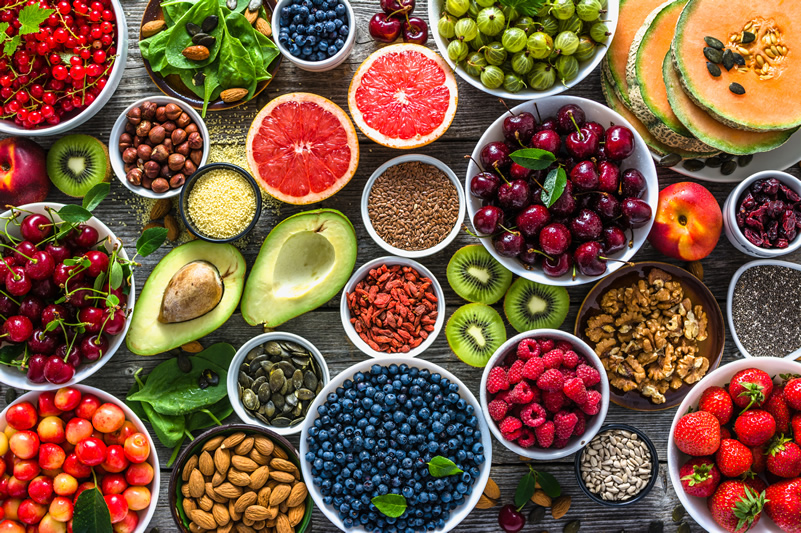
Simple ways to support your mood through diet and lifestyle choices
Mood can be influenced by many factors, such as
- stress
- genetics
- environment
- mood disorders
- poor sleep
- nutritional deficiencies.
However, certain foods may help improve overall brain health and certain types of mood disorders.
Healthy fats
- Oily Fish (organic salmon, sardines, mackerel
- Nuts and Seeds- e.g., walnut nuts, flaxseeds, chia seeds,
- Olive oil
- Avocado
- Or consider a very good quality fish oil supplement I recommend Bare Biology as it uses oil from wild, sustainably caught fish. Vegans – may have to look at an algae based supplement containing EPA and DHA
Why?
These fats are rich in Omega 3, which plays an important role in brain function and may help with symptoms of depression. (Rao et al. 2008; Müller et al. 2015).
Protein
A palm sized piece of good quality protein at each meal including breakfast.
Why?
Contains tryptophan, which is needed to produce a neurotransmitter serotonin, our happy hormone. (Young, 2007). Increasing this may improve mood, memory and sleep quality.
Foods high in Tryptophan
- Lean chicken and turkey and a source of Vitamin B6 - important co factor for production of serotonin (Parra et al. 2018).
- Beef Steak
- Tofu
- Salmon (organic if possible)
- Eggs
- Edamame Bean
- Pumpkin Seeds
- Sweet potato (USDA 2021)
Fermented Foods
- Live yoghurt
- Kefir
- Sauerkraut
- Kimchee
- Kombucha
Why?
Fermented foods promote a healthy gut microbiome and encourage beneficial bacteria to flourish. A happy gut may have a positive effect on our mental health (Selhub et al. 2014). The gut bacteria produce 95% of the body’s supply of Serotonin, our happy hormone!
Top up on foods containing good levels of B vitamins
- Whole grains (brown rice, barley, millet)
- Meat (red meat, poultry, fish)
- Eggs and dairy products (milk, cheese)
- Legumes (beans, lentils)
- Seeds and nuts (sunflower seeds, almonds)
- Dark, leafy vegetables (broccoli, spinach, kale)
- Fruits (citrus fruits, avocados, bananas)
B vitamins are essential for mood regulation, (can make us feel energised and alert) and overall brain health. Help to also produce our happy hormone, serotonin.
Magnesium
- Rye, wild rice, buckwheat
- green leafy vegetables spinach, lettuce, chard, kale and spring greens
- nuts and seeds - pumpkin, sesame, sunflower, pistachio, cashew, almonds, peanuts, hazelnuts, Brazil nuts, pecans, coconut,
- pulses and beans (lentils, lima beans, kidney beans, soya beans),
- bananas,
- avocados,
- garlic
- halibut.
Why?
Magnesium is essential to optimal brain health. May help to regulate mood and sleep. It helps to release GABA, a neurotransmitter that helps to calm and sooth the central nervous system and anxiety.
Anti oxidants – Eat the rainbow!
- Sweet potato,
- avocado,
- dark green leafy vegetables,
- yellow / red peppers, pumpkin, butternut squash, broccoli, cabbage, cauliflower, watercress, celery, radish, parsley, lettuce,
- apples, pears, berries, pineapple, mango, papaya, apricots, bananas, kiwi fruit, pomegranate.
Why?
Protect the brain from damage by free radicals which may help boost mood.
Reduce all stimulants.
- Caffeine – replace with herbal teas
- Alcohol
Why?
May deplete essential brain health nutrients, e.g. Vitamin B1 and put extra negative pressure on the adrenals (theses produce hormones that help regulate your metabolism, immune system, blood pressure, response to stress and other essential functions.) and nervous system (Noronha et al. 2014; Jin et al. 2016; Adjibade et al. 2019).
Control Blood Sugar
Avoid Refined Carbohydrates e.g. heavily processed foods white bread, white pasta, white rice
Why?
These foods send blood sugar sky high which leads to it crashing down agin which makes us feel sluggish irritable and low.
And finally a simple lifestyle addition
Daily outside walk, which may boost serotonin levels improving sleep, focus and mood. (Young, 2007; Hori et al. 2016).

